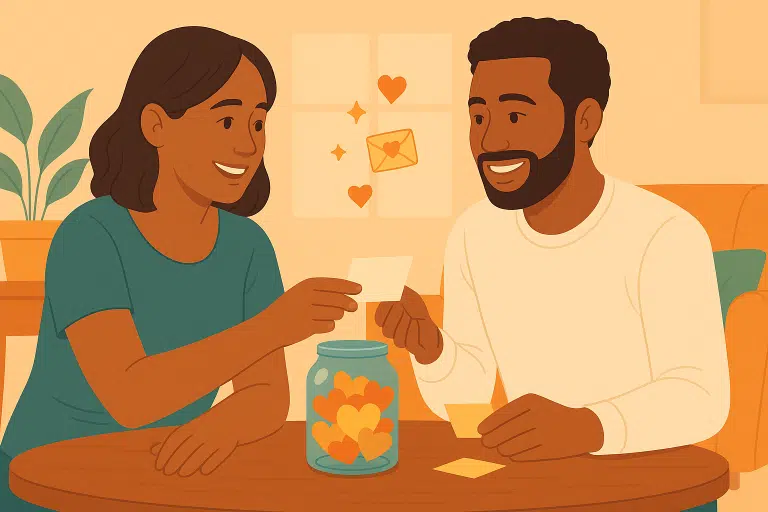
An AI Therapist? Let’s Unpack the Pros and Cons
Artificial intelligence (AI) is showing up everywhere these days—even in therapy. From chatbots that check in on your mood to apps that help you manage
Has the passion in your relationship gone missing?
Are you and your partner feeling distant from lack of touch?
Do you feel like the two of you just aren’t on the same page sexually?
Maybe you both have wildly different ideas about what happens in the bedroom. Perhaps you need an emotional connection for there to be sex, while your partner needs sex for there to be an emotional connection. Or maybe you want to try new things and be more adventurous in the bedroom, but your partner isn’t interested.
Over time, your sexual differences could make you wonder if you’re even compatible. As a result, you may find yourself worrying about the future of your relationship and thinking of seeing a sex therapist.
At the moment, you and your significant other may feel gridlocked in a pattern of sexual frustration. Maybe your partner just doesn’t seem to want to have sex anymore. As badly as you want it, you’ve grown tired of asking—you know that doing so will only result in more frustration.
On the other hand, maybe you’re the one who’s struggling to feel interested in sex. You may be so preoccupied with other problems that you can’t “get out of your head” during sex—you don’t feel connected to your body because your mind is always ruminating on other things.
Because of your sexual disconnection, a coldness may have settled over your relationship. Instead of feeling genuinely in love, you and your partner might feel like you’re just roommates now.
If both of you want to improve your sex life and rekindle the spark that set your relationship aflame in the beginning, we encourage you to pursue therapy with us. Here at Couples Counselling Centre, we specialize in helping couples and individuals work through sexual issues and feel more connected to their bodies.
Early on in a relationship, nature helps you bond with another person by creating a cocktail of hormones in the reward centre of your brain. This is what makes you crave your partner intensely during the infatuation stage of a relationship. After a while, however, the dopamine rush of being in love begins to wear off. Sexual desire starts to lose its intensity. As a result, you and your partner may wonder: What’s wrong with us? Why aren’t we madly in love anymore?
The truth is that there’s nothing wrong with you—nature is simply taking its course. No couple can sustain the infatuation stage forever. The good news? Many couples are still able to maintain satisfying sex lives in long-term relationships. The evidence is clear that people in long term relationships have very gratifying sex! As long as there is healthy communication and an atmosphere of emotional safety, the bedroom doesn’t have to be a place of frustration. We can help you get there.
Have you ever noticed how, in movies and in porn, nobody ever has to say anything during sex? There’s no teamwork and no communication. No one ever stops to say, “This position is hurting my back,” or, “Excuse me, can you move over? I’m falling off the bed.” Sex is depicted as easy, effortless, and free-flowing.
In the kind of culture where these portrayals are so common, it’s only natural that so many people are dissatisfied with their sex lives. In real life, sex can be frustrating and awkward. There are so many factors that make it difficult—medical issues, negative body image, past infidelities, messaging we received about sex and histories of sexual trauma.
This is why it’s so crucial to seek support. Whether you’re single or in a committed relationship, therapy can help you work through these deep-rooted issues, break down false beliefs, and enliven your sex life in the process.
At Couples Counselling Centre, we don’t simply teach sexual techniques or assign new positions. It’s not enough to prescribe new solutions without considering the context in which sexual problems happen. Instead, we are interested in getting to the root of your issues so that there can be benefits that last long after therapy is over.
As psychotherapists, we are best positioned to support you. After all, the brain is the strongest sexual organ. You can’t treat sexual issues without treating mental health issues, because the two are inherently connected. Together, we’ll look at how problems like low self-esteem, performance anxiety, and unhealed trauma may be contributing to your sexual challenges.
Our practice offers sex therapy for anyone struggling with sexual issues. In addition to supporting couples, we provide counselling for individuals who are looking to heal from sexual trauma, overcome negative beliefs about sex, and work through a variety of sexual issues. No matter what your current struggles are, let’s work together to uncover the layers of your sexuality, building not only a deeper understanding but also a pathway to greater intimacy and satisfaction!
Our therapists use different interventions depending on the root of your issues. If you and your partner feel like you’re not on the same page sexually, we can teach you communication skills for expressing your needs and desires openly and honestly. And if sex has become tense and performance anxiety has started to affect your intimacy, we can use mindfulness and relaxation techniques to help you reduce your stress and maintain present-moment awareness.
On a deeper level, therapy can teach you to understand your sexual scripts—the ideas about sex that you were raised with or taught by culture—and focus on modifying or unlearning them. Doing so can help you be more present in the body and make sex less stressful. For instance, maybe you’ve always believed that you need to orgasm for sex to be fulfilling. Therapy can help you challenge this belief and focus more on enjoying sex instead of being so focused on the outcome of it. This shift can truly be life changing.
In this way, you can expand your sexual menu and be more playful, spontaneous, and present in the bedroom. You and your partner can explore new fantasies safely and openly and be more in tune with each other’s needs, desires, and boundaries. Most importantly, sex can be enjoyable again. By helping you foster a stronger emotional connection between you, counselling can make sexual intimacy a source of happiness in your relationship.
Let’s face it: talking about sex can be embarrassing. As mental health professionals, we are aware of this and seek to go at whatever pace is right for you. There is no pressure to delve into the details of your sex life right away. Instead, our first priority is creating an atmosphere of openness, non-judgment, and acceptance. That way, you can ease into the process of sharing your challenges and engage with us at your own comfort level.
No, you won’t. Your therapist may assign you homework to practice in the privacy of your own home (e.g., ways to increase intimacy without focusing on sexual performance), but you’ll never be asked to engage in sexual activity during sessions.
As experienced couples therapists, it’s our belief that you can’t really separate sex therapy from couples therapy. After all, most sexual issues in a relationship are rooted in deeper patterns of emotional disconnection. That’s why we take a holistic approach to therapy, looking at both the emotional issues and sexual dynamics within your relationship.
If your struggles are more emotional than physical, therapy may be more relationship-focused than sex-focused. But in the end, there is no need to decide between sex therapy and couples therapy—we can engage in both.
If you and your partner want to deepen your sexual and emotional connection, we encourage you to pursue counselling with us. To get started, you can use the Book Now page to schedule a free 15-minute video (or phone) consultation.


Artificial intelligence (AI) is showing up everywhere these days—even in therapy. From chatbots that check in on your mood to apps that help you manage

Pornography is, and has always been, a controversial topic. Porn is often viewed negatively and stigmatized in our society, making viewers feel shameful, guilty, and

We all hit rough patches in relationships. Whether it’s constant arguments, feeling more like roommates than partners, or a creeping sense of disconnection, many people

Proudly serving Individuals, Couples and Families all across Ontario!
Subscribe Now
Subscribe to our newsletter to get tips on how to keep the relationships in your life healthy. We promise we won’t spam you!
Our diverse team of therapists are proud members of






You cannot copy content of this page

Do you have a question and can’t find the answer? Looking for more info? Leave us a message below.
OR

Hey! Thanks for visiting us. Want to learn more or get started? Message us today!